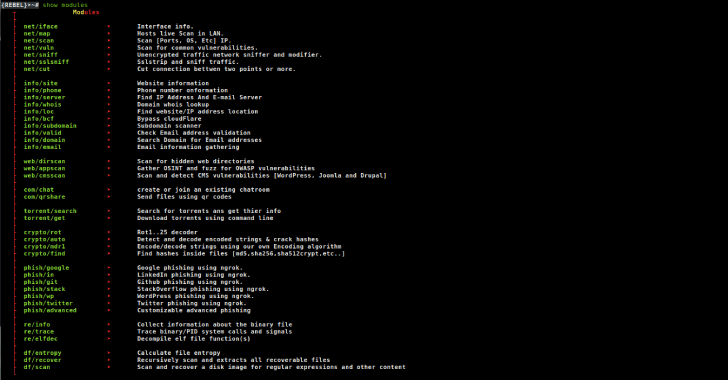Rebel framework is an advanced and easy to use penetration testing framework.
Start
git clone https://github.com/rebellionil/rebel-framework.git
cd rebel-framework
bash setup.sh
bash rebel.sh
Modules

Screenshots


Demos
Supported Distributions
| Distribution | Version Check | Supported | Dependencies already installed | Status |
|---|---|---|---|---|
| Kali Linux | 4.4.0 | yes | yes | working |
| Parrot OS | 4.14.0 | yes | yes | working |
Also Read – SysAnalyzer : Automated Malcode Analysis System
PORT YOUR OWN TOOLS TO REBEL !
scan.py
┌─[root@parrot]─[~]
└──╼ #python scan.py -h
-h –help print usage
usage ./scan.py
controller.sh sample
!/bin/bash
normal=’\e[0m’
arr[0]=’\e[1;94m’ ; blue=${arr[0]}
arr[1]=’\e[1;31m’ ; red=${arr[1]}
arr[2]=’\e[1;33m’ ; yellow=${arr[2]}
arr[3]=’\e[1;35m’ ; purp=${arr[3]}
arr[4]=’\e[1;32m’ ; green=${arr[4]}
arr[5]=’\e[97m’ ; white=${arr[5]}
grayterm=’\e[1;40m’
module=$(echo $1 | cut -d ‘/’ -f 2 )
if [[ $module != “scan” ]] ; then
echo -e “${red}[x] Wrong module name”
exit
fi
misc(){
if [[ $1 == “back” ]] || [[ $1 == “exit” ]] || [[ $1 == “quit” ]] ; then
exit
elif [[ $1 == ‘!’ ]] ; then
$2
elif [[ $1 == “clear” ]] || [[ $1 == “reset” ]] ; then
clear
elif [[ $1 == “help” ]] || [[ $1 == “?” ]] ; then
bash print_help_modules.sh help
elif [[ $1 == “banner” ]] ; then
rand=”$[ $RANDOM % 6 ]”
color=”${arr[$rand]}” # select random color
echo -e $color
python print_banner.py
elif [[ $1 == “” ]] ; then
:
else
echo -e “${purp}[-] Invalid parameter use show ‘help’ for more information”
fi
}
target=”site.com”
while IFS= read -e -p “$( echo -e $white ; echo -e ${grayterm}{REBEL}➤[${white}$1]~#${normal} ) ” cmd1 ; do
history -s “$cmd1”
if [[ ${1} =~ ‘re/’ ]] ; then
if [[ $( echo $cmd1 | cut -d ” ” -f 1 ) == “show” ]] ; then
if [[ $( echo $cmd1 | cut -d ” ” -f 2 ) == “options” ]] ; then
{
echo -e ” Option\t\t\t\t|Value”
echo -e ” ======\t\t\t\t|=====”
echo -e ” target\t\t\t\t|$target”
} | column -t -s “|”
elif [[ $( echo $cmd1 | cut -d ” ” -f 2 ) == “modules” ]] ; then
bash print_help_modules.sh modules
elif [[ $( echo $cmd1 | cut -d ” ” -f 2 ) == “help” ]] ; then
bash print_help_modules.sh help
fi
elif [[ $( echo $cmd1 | cut -d ” ” -f 1 ) == ‘set’ ]] ; then
if [[ $( echo $cmd1 | cut -d ” ” -f 2 ) == ‘target’ ]] ; then
target=$( echo $cmd1 | cut -d ” ” -f 3- | sed “s/’//g”)
fi
elif [[ $( echo $cmd1 | cut -d ” ” -f 1 ) == ‘run’ ]] ; then
python scan.py $target
else
misc $cmd1
fi
fi
done
if [[ $module != “scan” ]] ; then
echo -e “${red}[x] Wrong module name”
exit
fi
misc(){
if [[ $1 == “back” ]] || [[ $1 == “exit” ]] || [[ $1 == “quit” ]] ; then
exit
elif [[ $1 == ‘!’ ]] ; then
$2
elif [[ $1 == “clear” ]] || [[ $1 == “reset” ]] ; then
clear
elif [[ $1 == “help” ]] || [[ $1 == “?” ]] ; then
bash print_help_modules.sh help
elif [[ $1 == “banner” ]] ; then
rand=”$[ $RANDOM % 6 ]”
color=”${arr[$rand]}” # select random color
echo -e $color
python print_banner.py
elif [[ $1 == “” ]] ; then
:
else
echo -e “${purp}[-] Invalid parameter use show ‘help’ for more information”
fi
}
target=”site.com”
while IFS= read -e -p “$( echo -e $white ; echo -e ${grayterm}{REBEL}➤[${white}$1]~#${normal} ) ” cmd1 ; do
history -s “$cmd1”
if [[ ${1} =~ ‘re/’ ]] ; then
if [[ $( echo $cmd1 | cut -d ” ” -f 1 ) == “show” ]] ; then
if [[ $( echo $cmd1 | cut -d ” ” -f 2 ) == “options” ]] ; then
{
echo -e ” Option\t\t\t\t|Value”
echo -e ” ======\t\t\t\t|=====”
echo -e ” target\t\t\t\t|$target”
} | column -t -s “|”
elif [[ $( echo $cmd1 | cut -d ” ” -f 2 ) == “modules” ]] ; then
bash print_help_modules.sh modules
elif [[ $( echo $cmd1 | cut -d ” ” -f 2 ) == “help” ]] ; then
bash print_help_modules.sh help
fi
elif [[ $( echo $cmd1 | cut -d ” ” -f 1 ) == ‘set’ ]] ; then
if [[ $( echo $cmd1 | cut -d ” ” -f 2 ) == ‘target’ ]] ; then
target=$( echo $cmd1 | cut -d ” ” -f 3- | sed “s/’//g”)
fi
elif [[ $( echo $cmd1 | cut -d ” ” -f 1 ) == ‘run’ ]] ; then
python scan.py $target
else
misc $cmd1
fi
fi
done

















